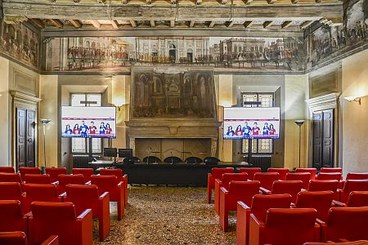Who is at higher risk to develop Post-COVID-19 Syndrome?
Analysis of a cohort of non-hospitalised individuals

-
Date: 17 DECEMBER 2024 from 17:30 to 19:00
-
Event location: Sala Rossa, Palazzo Marchesini, Via Marsala, 26 - Bologna - In presence and online event
-
Type: Lectures
COVID-19 is a multisystemic disease that varies from asymptomatic, mild, severe to fatal disease. The presence of variation suggests distinct clinical phenotypes that may be associated with progression to severity and to Post-COVID-19 Syndrome (PCS). Despite that the majority of COVID-19 patients convalesce at home (outpatients), most of the research regarding clinical phenotypes of COVID-19 involves hospitalized individuals. Our aim was to uncover and characterise clinical phenotypes of mild COVID-19 in non-hospitalised individuals and the risk to develop PCS up to 2 years post-infection. For this purpose, we have prospectively followed participants enrolled in the COVID HOME study, an ongoing prospective cohort of outpatient SARS-CoV-2 infected individuals and their household members in northern Netherlands. We performed systematic monitoring of clinical, and hematologic, biochemical and immunological parameters throughout their 21-day acute disease and then followed individuals at 3, 6, 12, 18 and 24 months post-infection to determine the presence of long-term sequelae or PCS. Home-convalescing individuals with mild acute COVID-19 can be classified into three phenotypes, differing in disease severity and in the likelihood to develop Long-COVID. Their different characteristics can be used by practitioners and health personnel to better manage these patients and to early identify those with a higher risk of developing PCS for timely treatment.
DO YOU WANT TO ATTEND THIS lecture?
-
In presence - Book your seat
Book your seat within December 17, 12 p.m. The places will be assigned on “first come first served” basis.
Please note that the building is not equipped so as to facilitate access for wheelchair users or people with mobility issues.
PhD students and researchers who are interested may request an attendance certificate by writing to segreteria.isa@unibo.it specifying their birthplace and date of birth.
The delivery of the attendance certificate requires the attendance of at least 70% of the lecture.
Subscribe
- Book your seat Published
